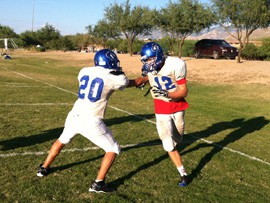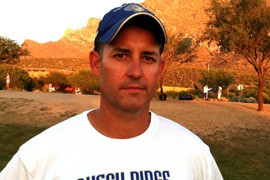Cronkite News has moved to a new home at cronkitenews.azpbs.org. Use this site to search archives from 2011 to May 2015. You can search the new site for current stories.
Law requires online concussion class for high school athletes
ORO VALLEY – When her son, Phillip, complained about headaches that wouldn’t go away after several days, Deannea Tanner at first chalked it up to allergies.
Then Phillip, a center for his high school’s football team, asked if it could be a concussion.
“I said, ‘Well, did you get hit?’” she said. “He said, ‘Mom, it’s football. Of course I got hit.’”
It turned out that Phillip had been kicked in the head so hard playing for Pusch Ridge Christian Academy’s varsity team that he had retrograde amnesia. He couldn’t remember getting hit at first.
Phillip’s parents credit his knowledge of concussions to an online course required for prep athletes taking part in any sport.
He was still frustrated watching his teammates from the sidelines during a recent practice.
“I was kind of mad because I couldn’t play anymore,” said Phillip, a junior.
Under a state law that took effect in 2011, the AIA, Barrow Neurological Institute at St. Joseph’s Hospital and Medical Center and the Arizona Cardinals developed a free online course called Brainbook, available via AIA’s website.
To date, more than 130,000 student-athletes have taken the concussion awareness course, according to Harold Slemmer, executive director of the Arizona Interscholastic Association (AIA).
“We’re pleased with the progress,” Slemmer said. “We wanted to increase concussion awareness because we take these injuries very seriously.”
The site allows school administers to track which athletes have completed the concussion course.
The AIA goes beyond the state law by requiring coaches and officials to take an online concussion-awareness tutorial offered for free by the National Federation of High School Associations.
Troy Cropp, who volunteers as head football coach at Pusch Ridge, said the requirements have changed his outlook on concussions.
“Although it’s a pain in the rear end, and we have more kids out than we ever have before because of it, it’s still practical,” he said. “Brain trauma is a big deal. We don’t want kids’ brains damaged.”
“It was easy and very informative for us. It covered all the bases,” added Andy Fetsis, the defensive coordinator. “You have to do it because it’s a dangerous situation.”
Kristin Miller, athletic trainer at Pusch Ridge, said the law has proven effective.
“Our athletes are doing a better job of self-reporting,” she said. “There’s an awareness, and they understand the severity of an injury such as a concussion.”
But Miller said she’d like to see more required of schools. For example, since arriving at the school five years ago she has required an online memory and reaction test to obtain baseline neurocognitive data for each athlete.
“There was a time when you would have a diagnosis of getting your bell rung,” Miller said. “As we’ve become better educated through research on concussions, we’ve learned that the symptoms may subside, but they will return 24-48 hours later. To use the term ‘getting your bell rung’ is a lack of education.”
Dr. Javier Cardenas of Barrow Neurological Institute, who helped write the state law, said he’s glad it covers all athletes.
“I’ve seen concussions happen in just about every sport,” he said.
Cardenas would like to see more robust educational policies for youth sports, such as Pop Warner football, Little League and club soccer. But society is a pendulum swinging, he said.
“When I was playing football, if you suffered a concussion, you went right back out on the field,” Cardenas said. “Now we put everyone in a bubble. There are far greater benefits to athletic endeavors than no physical activity – obesity is a huge problem.”
Phillip Tanner was scheduled to play Friday, Oct. 12, for the first time in five weeks. Besides sitting out games and practices, his recovery included not being able to text, play video games or watch TV.
“It was really bad,” he said. “I had to miss five days of school. I was so bored.”
His mother, Deannea, said she’s relieved to have learned what ailed her son so he could get better.
“A few years ago, without all of this testing, he might have gone undiagnosed,” she said. “It’s objective; it’s not based on what the kid is telling you. Because kids tell you what they think you want to hear.”









